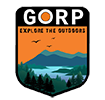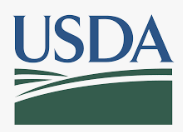Outdoor Hygiene Tips
It’s no secret that having good hygiene is essential to healthy living. How do you keep on top of hygiene when you’re in the great outdoors? It is a lot easier to keep up in the comfort of your own home simply because you have everything you need within reach.
Hygiene outdoors can be more challenging, but it’s vital to pay attention, not just for your own health, but for your traveling companions’ happiness as well. Keep in mind that when you are outdoors, getting help for that random infection or upset stomach may take hours or days.
For the minimalist, camping is a great way to go on an adventure and disconnect from the real world. Even though you may be roughin’ it, there is are still minimalist and straightforward ways to bring your hygiene products with you when out in the wild.
This article will discuss how to keep yourself clean while camping, hiking, and exploring, and why it is important. In addition, we will cover the essential hygiene products to bring while camping.
Why Is Hygiene Important When Camping or Hiking?
As kids, we were always told to take a bath, brush our teeth two times a day, clean our ears, and, of course, wash our hands. It may have seemed like nonsense at the time because we had better things to do.
Whether we believed it or not, there was, of course, a point to our parents’ obsessiveness to keep our hands, head, and body clean.
Having good hygiene is important because it helps stop germs and illnesses from potentially spreading. Unchecked germs can result in illnesses and infections, or you could contaminate your food and drinking water. You also can potentially spread the germs or infections to others.
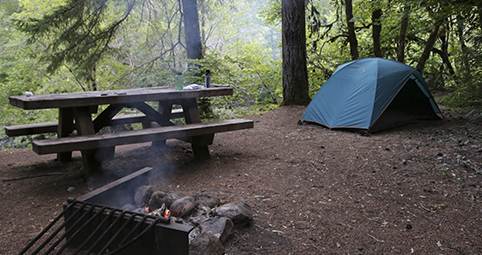
More About Bacteria than Germs
When you are in the outdoors, you will want to think more bacteria and infections than catching viruses or germs, as might focus on in more crowded spaces.
Many bacteria and fungi in the water, air, or on plants can cause an upset stomach, perhaps in a major way. While you won’t necessarily be contagious, it could knock you out of commission for a day or two.
Having good hygiene impacts your health and protects the people around you. So, what does this have to do with camping?
When you are camping in the outdoors, you are more susceptible to getting abrasions. If your body isn’t clean, then you are much more likely to get a wound infected. And although there was an old saying when a person got injured, “Just rub some dirt on it!”, this isn’t advice to be taken literally. While that may be the easy way of saying to get over your wound and toughen up, there are actually serious precautions a person should take when caring for themselves in the outdoors.
Having good hygiene in the outdoors isn’t just about avoiding infection either. It is also important because it will help you prevent sickness, urinary tract infections, skin irritations, bad breath, and body odor.
So how do you keep yourself clean when you are camping? Read on as we talk about the simple tips and tricks for having good hygiene while living outdoors.
How To Have Good Hygiene When Camping or Hiking
Whether your campground has full bathroom facilities or you are 8 miles back in a mountain canyon, you need to know how to keep your hygiene up to par. Here are the top four ways to improve your hygiene while camping.
Brushing Your Teeth
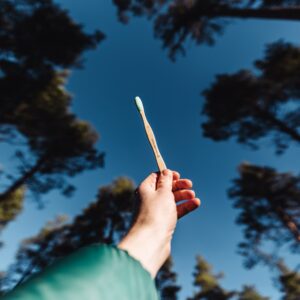
This might be an obvious hygiene tip, but people forget to do it when they are outdoors. Brushing your teeth is essential whether you are indoors or outdoors. It should be a daily ritual to protect your teeth, gums, and even your heart health!
When camping, it is easy to indulge in all of the tasty food like pasta salad, hotdogs, and, of course, smores! A lot of these snacks and meals can get stuck in the teeth. Not brushing can lead to bacteria increasing in your mouth — and they absolutely love sugar. A regular brushing also helps get rid of bacteria that may have accumulated in your mouth during the day.
Typically speaking, dentists recommended brushing your teeth two to three times a day. However, when camping, it is harder to access clean water for brushing. If you don’t have clean water easily accessible, try to at least brush your teeth once a day. Campers can also grab a travel-size bottle of mouthwash to help kill bacteria!
Bathe or Use Disinfectant Wipes
If you have done any camping, you have probably endured sweaty moments. Whether you are trekking to a backcountry lake with a 40 lb pack on your back or setting up camp at a fishing access, it is easy for our hygiene to go downhill.
The problem with that sweat is that it can build-up, and then cause bacteria to form. The body odor you might experience after sweating is actually bacteria manifesting itself. Anytime you have bacteria on your skin, any scratches or abrasions could be more likely to get infected.
When camping in an established campground that offers bathroom facilities, take advantage of their showers. Showering once a day or at least rinsing off in the outdoor shower is a good idea. In the event that there are no bathroom facilities, there is nothing wrong with rinsing off in a stream, river, or lake as long as the water is deemed safe.
A great alternative to rinsing off if no shower or clean water is available is using disinfectant wipes. Something as simple as wipes from a dollar store will be good enough to cleanse your skin while camping.
Just remember the camping and hiking ethic: Pack-in, pack-out. Whatever you do, do not ever leave litter in the wild.
Bio-Degradable Soaps
People often forget that the soap you buy at the store is not always a naturally-occurring chemical or mineral in the wild, so you want to avoid using just any old soap to bathe in that pristine mountain lake. Using an environmentally-friendly, biodegradable soap can help minimize the footprint you leave outdoors.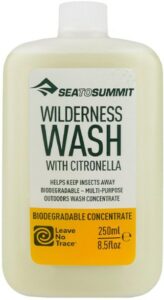
You can find these soaps almost anywhere, ranging from online shops to outdoors stores. They come in small quantities so they are easy to carry along in a backpack.
Use Hand Sanitizer
Using hand sanitizer is one of the lowest-effort, highest-payback ways to prevent germs. Whether you are camping, hiking, or simply walking around Europe, you might pick up random germs in places where hand-washing would be challenging. Your hands are the number one way bacteria is spread, and in the outdoors, being exposed to bacteria is more likely. Due to the nature of being outside, our hands are more likely to be exposed to bacteria because the hygiene care is generally less.
Use hand sanitizer when access to clean water is hard to come by. Additionally, hand sanitizer is a great go-to after using the bathroom or before handling food when camping.
When buying hand sanitizer, be sure that the alcohol content of the sanitizer is at least 60%, per FDA guidance.
Bring The Basics
Lastly, an easy way to keep good hygiene is by bringing the basics. Think about the same things you use every time you shower and get ready for the day. You may want to opt for travel-size items if possible so you don’t have to carry a lot. You can just stick them in your backpack or fanny pack and know they are there.
However, that does mean deeming what is “necessary” to your health and well-being. You may use hair gel every day at home, but is it really a must-have when you’re in the wilderness?
If you go to any supermarket’s travel section, you will find travel-size deodorant, body wash, shampoo, disinfectant wipes, hand sanitizer, mouth wash, toothpaste, and conditioner. These are the basic things that will keep your skin clean, breath fresh, and hair healthy. While you are at it, don’t forget a super simple first aid kit. This might be borderline “hygiene” but you never know when someone you are with gets a hiking injury.
Keep a Clean Camp
Keeping a clean campsite is imperative when camping overnight. When you leave food, dirty dishes, unclean cookware like camping stoves, and other things out, you are inviting dirt and unsanitary conditions. Imagine that you have breakfast, and keep dirty bowls out while you go and enjoy the sunrise. While you are gone, your bowls attract squirrels, birds (and their droppings), flies, and all kinds of other problems. That is just one of many examples of how a messy and dirty campsite will attract more and more of a mess.
In areas with more dangerous animals, a dirty camp could actually attract bears or rabies-carrying vectors. A grizzly bear, for example, can smell the scent of food from more than a mile away. Best to keep the camp very tidy, clean, and prevent curious animals from wanting to check things out.
What Not To Do
When practicing good hygiene, there are some simple things not to do — for example, wearing wet and dirty clothes when camping can increase the chances of getting sick and spreading bacteria.
Do not drink unfiltered water. Yes, that mountain stream or the northwoods lake looks gorgeous and pristine, but there could be microbes in the water that would make you sick. If you are on a shorter walk or hike, bring a water bottle along with cold water (pro tip: start with LOTS of ice in the bottle and it will turn in to cold water on your walk). We like the Owala lineup of water bottles.
If you will be on a longer trip, such as a full-day hike or overnight, get a handy water filter and use it. When you draw water from a stream or lake, find moving water to use, not stagnant water from the water’s edge.
Don’t leave dishes or food surfaces unclean. Wash them as early as you can. What happens when there are scraps of food left out? You attract bugs, flies, birds, and animals. The saliva or droppings from those creatures could work its way on to your utensils or surfaces. If you keep things completely clean, creatures will not be attracted.
Don’t eat snacks or meals without having clean hands. You might be tempted to reach for a handful of a hiking snack, but before you do give your hand a once-over and make sure you weren’t just handling something potentially harmful or toxic, like an unknown plant or mushroom, or cleaning up after your dog. If you were, wipe your hand well and give it a shot of sanitizer.
Speaking of mushrooms, don’t eat anything if you don’t know what it is!
Lastly, it may be obvious but when thinking about your normal bathroom or hygiene supplies, don’t bring the unnecessary items that need to be plugged in. This includes a hair dryer, curling iron, and clothes iron. When camping, there is no need for these things, because at the end of the day, who are you trying to impress? If you must have something that requires power, consider getting a solar panel so that you don’t need to rely on a running vehicle to power-up your stuff.
Top 5 Outdoor Hygiene Products
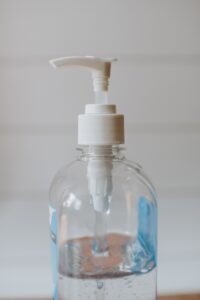
As we mentioned above, there are some must-have items when it comes to outdoor hygiene products. Here are five hygiene products that you need to bring with you on your next camping trip.
Combat Wipes ACTIVE Outdoor Wet Wipes
Combat Wipes are a top seller because of their ability to keep your skin fresh and clean in the dirtiest environments. Unlike other disinfectant wipes that are thin and easily tear, these are made of a thicker material so they can withstand more use.
Another big reason that the Combat Wipes are appealing is due to them being biodegradable. You don’t have to worry about having to pack dirty wipes out on a hike. Simply, bury the wipes deep into the soil, and the wipes will naturally decompose.
These wipes are also soothing to the skin. Packed with aloe and vitamin E, the wipes help refresh the skin while wiping away bacteria.
Giantex Portable Travel Toilet
If you manage to make it to a tent site with no facilities, there are good alternatives to squatting against a tree. Portable toilets like the Giantex are great if you need to use the restroom. It doesn’t take up much space, but it may also be a little too bulky for some hikers. It’s important to determine whether or not it’s right for you. However, it’s a great way to go to the bathroom in comfort, even if you’re outside.
KIPIDA Portable Camping Shower
There’s no doubt that showers are nice, and thanks to this portable camping shower from KIPIDA, it’s easier than ever to enjoy one even outside. The shower holds 5 gallons of water. To heat the water, fill the bag with water and let it sit in the sun for three hours. Unless you are into a cold shower, then just fill it up and turn on the showerhead!
This KIPIDA product also features a water temperature gauge and different pressure levels.
Sea to Summit Wilderness Wash Citronella
Taking soap for your body, kitchen supplies, and clothing is essential. However, bringing a bottle for each can compromise your pack space. What if you could get a soap that could clean them all?
Sea to Summit Wilderness Wash is an all-in-one wash that will clean your body, clothes, and dishes. The soap is biodegradable and completely safe for personal use, fabrics, and any outdoor kitchen gear.
Osprey UltraLight Roll Organizer
Your outdoor hygiene products need to go somewhere where they are organized and easily accessible. Getting an outdoor toiletry bag like the Osprey UltraLight Roll is the way to go.
Not only does it live up to its name by being ultralight, but it also has impressive storage space. This is a solid toiletry bag that can be used every day and taken off the grid. It has a hanging loop, and its pockets can surprisingly hold bulkier items without taking away from its slim storing capabilities.
The Osprey UltraLight also features a pocket mirror in the pack. This may not be a must, but it is handy to have when practicing good hygiene while camping.
